Opinion
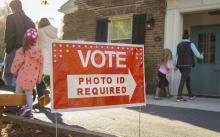
Immigration is never out of sight for those whose lives depend on it, even while it may have not been a topic of choice for presidential and vice-presidential debates this year. Candidates and lawmakers on both sides of the aisle have used the stories and experiences of immigrant people for political gain. But for many immigrant people, engaging in the larger immigration discourse and advocacy work is primarily about our families and our communities: their present reality and their future opportunities. It is not about touting a “welcoming” nature or defending a seemingly attacked territory or national identity as politicians and others have often approached it.
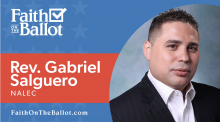
How do we, as a nation, miss Jesus in our national priorities? Is Jesus disappearing from the scene?
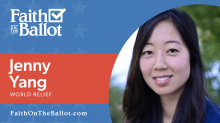
Jenny Yang, vice president of policy and advocacy on refugee resettlement at World Relief, offers a sermon on the refugee crisis ahead of the 2020 election.

Pope Francis has a penchant for impeccable, maybe even providential timing. His encyclical Laudato Si’ came out just months before the 2015 Paris climate summit and played a key role in influencing public opinion and galvanizing political will behind bolder climate action to protect “our common home.” Now, less than a month before the most consequential U.S. election in generations, the pope’s new encyclical provides a powerful rebuke to a politics of division, fear, and hate while also casting a vision for the human family that is deeply relevant to applying our faith to U.S. leadership in the world.
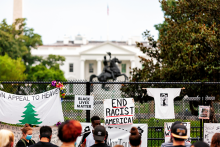
This executive order is dangerous. Instead of acknowledging that diversity, equity, and inclusion trainings can help work towards the country’s ideals of “liberty and justice for all,” it labels them as reverse racism and sexism.
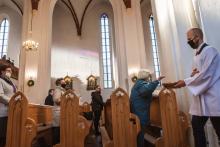
As churches create plans for re-opening their buildings and look toward a future where people have been vaccinated against COVID-19, there is an opportunity now to re-imagine church. Likely, it will never be the same. And maybe that’s for the better. Singing, hugging, and sharing food have become risky activities. I still grieve this, and yet the possibilities and imagination spurred by these limits excite me.
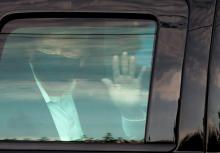
When news broke last week that the president was diagnosed with COVID-19, I tweeted that the psalm of the morning ought to be Psalm 109, which includes startling lines like "may his days be few" and "may his children be orphans." It was not in jest. While people had varying reactions to the news, the imprecatory psalms give Christians guidance on how to pray.
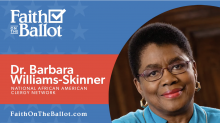
Dr. Barbara Williams-Skinner, Co-Convener of the National African American Clergy Network, shares an inspirational message and prayer for Christians to continue fighting for a free, fair, and safe election for all Americans.
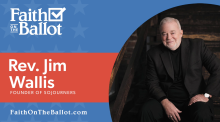
Racism is and must be a central issues for people of faith in this election. Racism denies the image of God in every person and is antithetical to the teachings of Jesus.
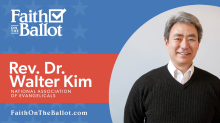
Our racial tragedy breaks God’s heart. Christ’s church must embrace and embody the work of justice and reconciliation to turn the tragic hostility of racism into a pursuit of hospitality.
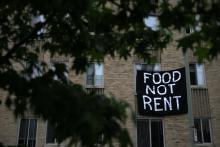
Despite our immense wealth as a country, poverty has always been a problem in the United States. It remains as an insidious legacy of slavery and systemic racism as well as an ever-present barrier in largely white rural communities and increasingly among Americans living in suburban communities.
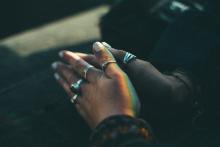
We shouldn't be surprised that an election that has come to be about race and culture is also the first in which the sitting president refuses to agree to a peaceful transfer of power. Both of us — a white Christian and a Black Christian, both evangelicals — have both been noticing how differently white people and Black people, even those on the same side of the political aisle, are talking about what we are up against.
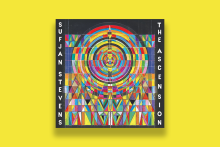
The album is titled The Ascension but, I’ve got to be honest, Sufjan Stevens’ latest masterwork has me feeling the lowest I’ve felt about this country since the start of quarantine.
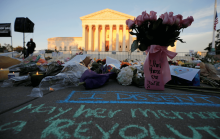
It was hard to remain hopeful this week — this year, really. We’re living in an age of dissent.
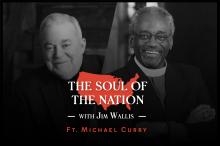
Rev. Jim Wallis speaks with Presiding Bishop Michael Curry of the Episcopal Church about God making a way for healing and love from the painful divisions of the coronavirus and white supremacy in our country.

There is no guarantee of divine reward for our goodness, nor threat of eternal punishment for our misdeeds. And yet, we are instructed each year, to stop the busyness of our lives, contemplate our own mortality, and make concrete changes based on our conclusions. One might wonder, why bother?
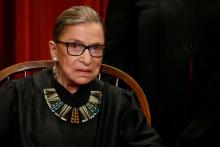
I think one of the biggest impacts of Ginsburg’s life is that her arguments didn’t just change legal frameworks, they also helped change cultural frameworks. In my life, I’ve moved through multiple cultural frameworks where there were remnants of the idea that men were the strong providers and protectors of women, and women were the dependents and nurturing centers of home and family life. The saddest part for me is that some those frameworks resided in my faith communities. The Bible was used to support the idea that men and women were locked into God-ordained, sex-based roles. Those “roles” made me feel I could not, or should not, make use of some of the opportunities I had.
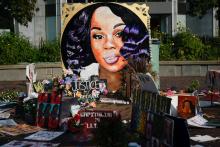
Breonna Taylor’s name didn’t even appear in Wednesday’s indictment against Hankison, which raises alarming questions about what case the attorney general made to defend the value of her life. The decision exposes the value gap in our justice system that so often dismisses and degrades the value of Black life and treats police recklessness and misconduct with impunity. Kentucky Attorney General Daniel Cameron failed to explain why Hankison felt it was necessary to shoot wildly and blindly into the apartment from the parking lot or the details around how this seemingly faulty no-knock warrant was obtained and executed in the first place.

Edward Said’s profoundly influential 1978 book, Orientalism, describes the term as the West’s portrayal of the East as decadent, static, exotic, and uncivilized. Most importantly, Said’s work emphasizes how these constructions of this exotic ‘other’ are rooted in the West’s need to define itself as different from and superior to the Orient. While his analysis focused on European and American essentializations about Islamic civilization, another implication of orientalism is what these same Western observers thought about their co-religionists in the birthplace of Christianity.
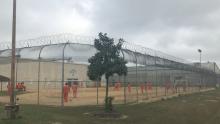
Forced sterilization of women is a form of abuse and an act of violence against the very image of God in these women in immigration detention. While these accounts are shocking and horrifying, they are unfortunately part of the larger pattern of abuse and neglect present in detention centers that immigrant people and immigration advocates have been denouncing for years.